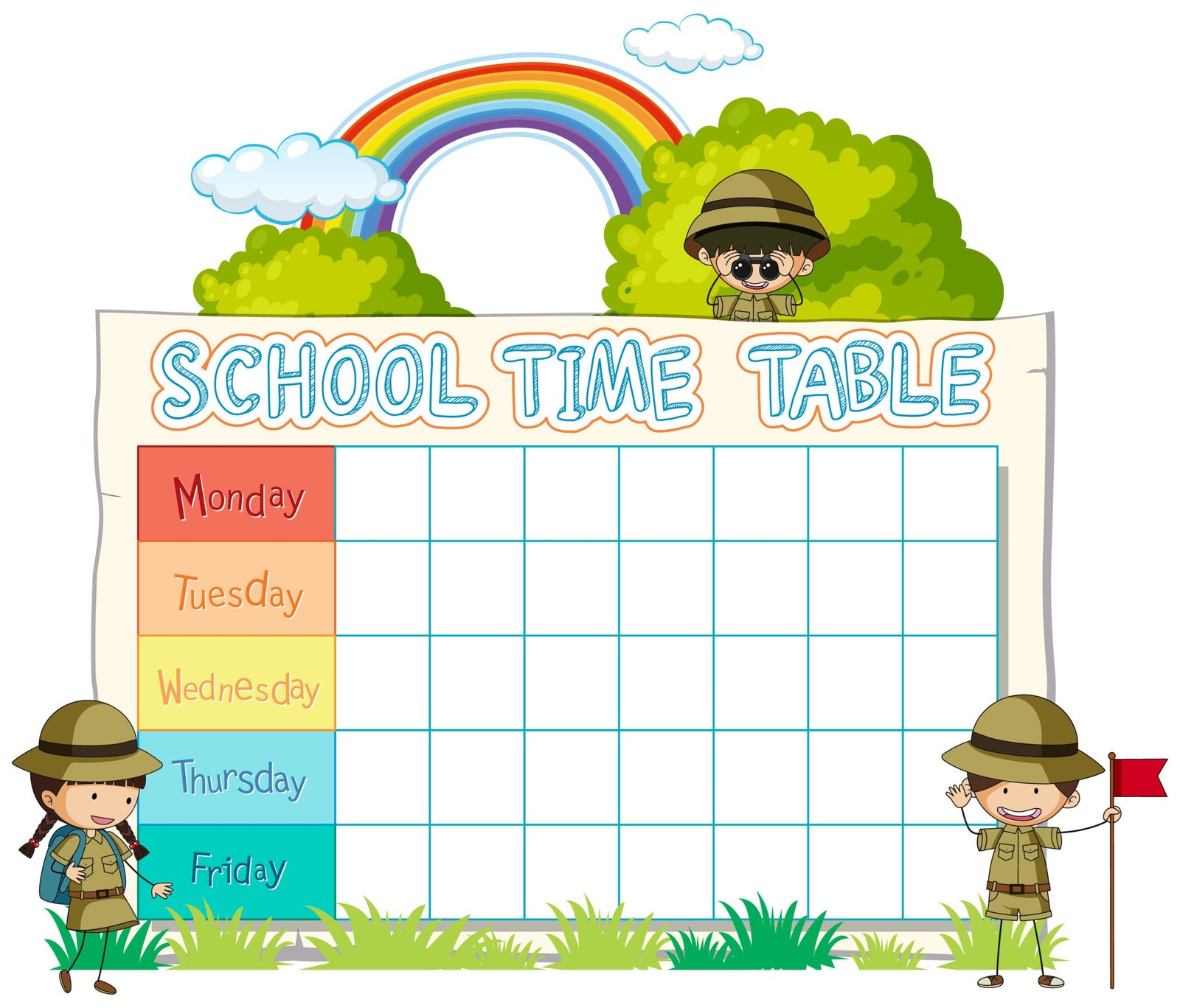An effective study timetable is key to academic excellence. It helps improve productivity, time management, and stress control. A thoughtfully designed study routine guides students in setting priorities, tracking progress, and preparing confidently for exams. By balancing studies with breaks and aligning study techniques with personal learning styles, students can increase focus and academic success.
Explore this guide to learn how to structure your time effectively and check out how the best CBSE schools in Bangalore support students with personalized timetables.
Toppers Study Time Table 2025
If you are planning to study from home, you can follow the study timetable provided below. Though the timetable of top performers varies from one individual to another, an ideal timetable of a topper would generally look like this:
| TIME | ACTIVITY |
|---|---|
| 6:00 AM | Wake Up |
| 6:30 AM – 7:30 AM | Yoga, stretching, or a morning walk |
| 7:30 AM – 10:00 AM | Study fresh topics with full concentration |
| 10:00 AM – 11:00 AM | Have breakfast and read the newspaper |
| 11:00 AM – 2:00 PM | Revise Previous Topics |
| 2:00 PM – 3:00 PM | Lunch & Take a Short Nap |
| 3:00 PM – 6:00 PM | Practice Previous Year’s Question Papers |
| 6:00 PM – 7:00 PM | Take a Break |
| 7:00 PM – 9:00 PM | Conclude remaining topics |
| 9:00 PM – 9:30 PM | Dinner/ Spend Time with Family |
| 9:30 PM – 10:30 PM | Revise the Topic You have Finished |
| AT 10:30 PM | Calm your mind and go to sleep |
Step 1: Evaluate Your Current Schedule
Before building a new routine, assess your existing schedule to find gaps and opportunities. This helps optimize time and avoid unproductive habits.
Identify Time Gaps and Available Hours
- Track your daily activities for a few days using a planner or app.
- Find time-wasting habits like extended phone use or TV.
- Use energetic hours for challenging tasks.
- Group similar tasks for better efficiency.
Understand Priorities and Commitments
- List key obligations: school, family, health, etc.
- Rank tasks using tools like the Eisenhower Matrix.
- Balance urgent needs with long-term goals.
- Avoid overcommitting and make space for self-care.
Step 2: Set Realistic Study Goals
Clear, achievable goals give your study plan purpose. Setting SMART goals helps break large tasks into simple, manageable steps.
Use the SMART Framework:
- Specific – Study the geography chapter.
- Measurable – Solve 20 questions.
- Achievable – Complete within 1 hour.
- Relevant – Based on the upcoming test.
- Time-bound – Finish by 6 PM.
Balance Short- and Long-Term Goals:
- Daily: Complete an assignment.
- Weekly: Finish an entire chapter.
- Monthly: Revise for a unit test.
- Track progress to maintain motivation.
Step 3: Break Study Time into Manageable Sessions
To stay focused and avoid burnout, study in blocks with short breaks.
Pomodoro Technique:
- Study 25 minutes, take a 5-minute break.
- After 4 sessions, take a 15–30 minute break.
- Use a timer and stick to session goals.
Divide Time by Subjects and Topics:
- Alternate between easy and hard subjects.
- Focus more time on weak areas.
- Rotate subjects to keep things fresh.
Include Practice and Review:
- Review previous lessons weekly.
- Use active recall and spaced repetition.
- Solve past questions and mock tests.
Step 4: Include Breaks and Leisure Time
Breaks are essential for restoring energy and mental clarity.
Benefits of Regular Breaks:
- Improve memory and reduce fatigue.
- Avoid long study slumps.
- Encourage creativity and relaxation.
Plan Breaks Smartly:
- Use your timer to schedule 5-10 minute breaks.
- Choose relaxing, non-distracting activities: music, walking, stretching.
- Avoid social media during breaks.
Add Physical Activity and Mindfulness:
- Short walks or yoga boost mood and focus.
- Try meditation to manage exam stress.
Step 5: Prioritize Difficult Subjects
Tackle hard topics when your brain is most alert—usually at the start of the day.
Strategies:
- Begin your day with your most difficult subject.
- Break complex topics into smaller parts.
- Celebrate small wins to stay motivated.
Stay Encouraged:
- Use rewards (snacks, hobbies) after completing tasks.
- Visualize exam success.
- Keep your long-term academic goals in mind.
Step 6: Stay Flexible and Adjust
Life can interrupt your plans—so flexibility is important.
Adapt Your Schedule:
- Make room for sudden family needs or events.
- Shift light tasks to busy days.
- Plan a buffer for catching up if needed.
Evaluate and Adjust:
- Check your progress every week.
- Adjust study techniques if you’re not meeting goals.
- Switch up strategies to stay fresh and motivated.
Step 7: Reflect and Improve
Reflection helps you stay accountable and fine-tune your schedule.
Track Your Study Time:
- Use a notebook or app to log sessions.
- Monitor which subjects take more time.
Evaluate What Works:
- Which study methods helped most?
- Where did you lose time or get distracted?
- What needs to change next week?
Conclusion
A personalized study timetable enhances learning, reduces stress, and builds discipline. Combine planning, realistic goal-setting, and smart scheduling techniques to increase your performance. With regular breaks, subject rotation, flexibility, and consistent reflection, you can build a routine that fits your academic goals and lifestyle.
Students from the best CBSE schools in Bangalore often follow similar strategies to stay ahead in their academic journey. You can do the same with the right mindset and tools.
FAQs
1. How long should I study in one session?
30–50 minutes is ideal. Use the Pomodoro technique to maintain focus.
2. How do I balance studies with other tasks?
Allocate time for both studies and personal activities. Use flexible blocks.
3. What helps avoid distractions?
Turn off phone notifications, use focus apps, and create a quiet study space.
4. How do I stay consistent with a schedule?
Set achievable goals, monitor progress, and stay flexible when needed.
5. How can I make a study plan for exams?
Divide topics by urgency, include revision sessions, and practice past papers.



